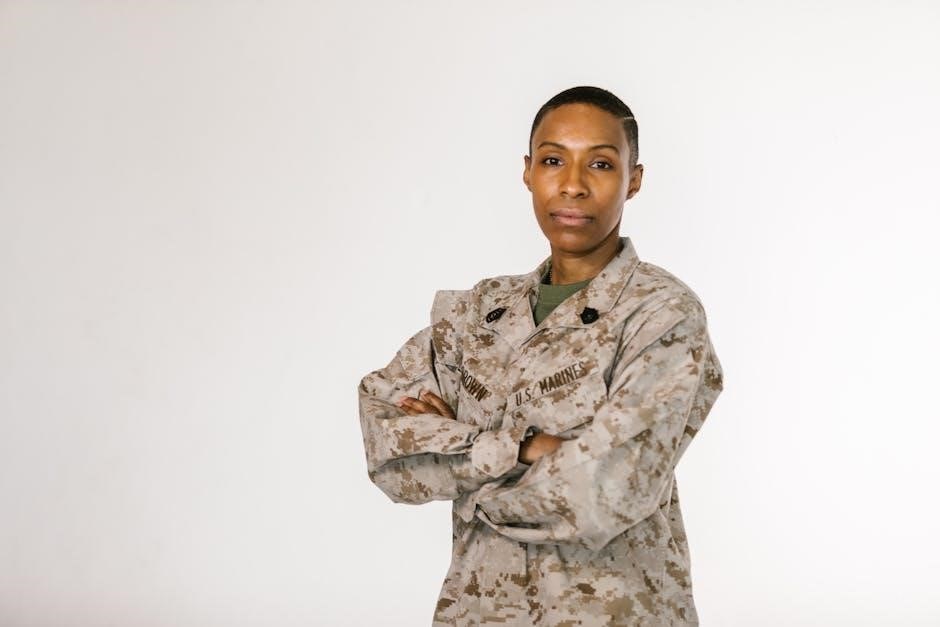The Leading Marines Answers PDF is a valuable resource for Marines preparing for leadership exams. It contains exam questions, answers, and study materials to enhance leadership skills. This guide emphasizes the importance of leadership in the Marine Corps, focusing on empowerment, technical prowess, and strong character. By leveraging this PDF, Marines can effectively prepare for exams while developing the skills necessary to lead with integrity and confidence.
Overview of the Leading Marines Guide
The Leading Marines Guide is a comprehensive resource designed to help Marines develop leadership skills and prepare for exams. It covers essential topics such as Marine Corps leadership philosophy, the role of NCOs, and core values like honor, courage, and commitment. The guide also includes practical tools and techniques, such as communication protocols and decision-making processes, to empower Marines in real-world scenarios. Additionally, it provides exam questions and answers, along with downloadable resources like PDFs, to aid in study preparation. By focusing on mentorship and subordinate development, the guide ensures Marines are well-equipped to lead effectively. Its structured approach makes it an invaluable tool for both training and professional growth.
Importance of Leadership in the Marine Corps
Leadership is the backbone of the Marine Corps, essential for mission success and unit cohesion. Effective leaders inspire Marines to embrace challenges, fostering resilience and initiative. The Corps emphasizes developing leadership qualities in every Marine, believing these traits can be cultivated through training and experience. Strong leadership ensures adherence to core values like honor, courage, and commitment, guiding Marines in ethical decision-making. It also empowers individuals to take ownership of their duties, fostering a culture of accountability and teamwork. By prioritizing leadership development, the Marine Corps prepares its members to overcome adversity and achieve excellence in any situation, embodying the spirit of a disciplined and formidable force.

Key Concepts in Leading Marines
Leading Marines emphasizes leadership philosophy, core values, and decision-making. It focuses on empowering Marines, fostering mentorship, and developing skills to lead with integrity and confidence in challenging situations.
Marine Corps Leadership Philosophy
The Marine Corps leadership philosophy is rooted in the belief that leadership qualities can be developed within each individual. It emphasizes empowerment, where Marines are entrusted with responsibilities that foster growth and accountability. This philosophy focuses on technical prowess, strong character, and the ability to inspire others. Leaders are expected to lead by example, demonstrating integrity, courage, and commitment. The core idea is that leadership is not inherent but can be cultivated through training, mentorship, and practical experience. This approach ensures that Marines are prepared to make tough decisions and lead effectively in high-stress environments. By nurturing leadership at all levels, the Marine Corps builds a resilient and adaptable force capable of overcoming any challenge.
The Role of Non-Commissioned Officers (NCOs)
Non-Commissioned Officers (NCOs) are the backbone of the Marine Corps, serving as frontline leaders responsible for guiding and developing junior Marines. Their primary role is to lead by example, ensuring tasks are executed with precision and discipline. NCOs are mentors, trainers, and decision-makers who embody the Corps’ core values. They oversee daily operations, enforce standards, and prepare Marines for challenges. Their leadership fosters unit cohesion and readiness. The role of NCOs is crucial in building a resilient and capable force. They are expected to demonstrate initiative, integrity, and judgment, inspiring their subordinates to excel. By balancing technical expertise with strong character, NCOs play a pivotal role in shaping the next generation of Marine leaders. Their influence is essential to maintaining the Corps’ high standards of performance and conduct.
Core Values: Honor, Courage, and Commitment
Honor, Courage, and Commitment are the foundational principles of the Marine Corps, serving as the moral compass for all Marines. These values are deeply ingrained in every aspect of Marine leadership and daily operations. Honor represents integrity and ethical behavior, ensuring Marines act with moral courage and accountability. Courage encompasses both physical and moral strength, enabling Marines to face challenges with resilience and determination. Commitment reflects loyalty to the Corps, fellow Marines, and the mission, fostering unity and dedication. Together, these values guide Marines in making sound decisions and conducting themselves with professionalism. They are essential for building trust and cohesion within units, ensuring the Marine Corps maintains its reputation as an elite fighting force. These principles are non-negotiable and form the bedrock of Marine leadership and identity.

Leadership Tools and Techniques
Effective communication, decision-making frameworks, and mentorship programs are essential tools for Marine leaders. These techniques foster growth, accountability, and teamwork, enhancing overall leadership capabilities and unit performance.
Communication Protocols in Marine Leadership
Effective communication is a cornerstone of Marine Corps leadership, ensuring clarity and precision in mission execution. Leading Marines Answers PDF highlights the importance of standardized communication protocols, emphasizing transparency and accountability. Leaders are expected to articulate clear orders, provide timely feedback, and foster an environment of open dialogue. Active listening and non-verbal cues are also stressed as critical components of effective communication. These protocols are designed to build trust, enhance unit cohesion, and ensure seamless coordination during operations. By adhering to these guidelines, Marines can maintain discipline and achieve mission success, even in high-stress environments. The PDF resource provides practical examples and test questions to reinforce these communication principles, making it an indispensable tool for leadership development.
Decision-Making Processes for Marine Leaders
Decisiveness is a critical trait for Marine leaders, as outlined in the Leading Marines Answers PDF. The decision-making process involves identifying the situation, gathering relevant information, and evaluating possible courses of action. Leaders are taught to prioritize mission accomplishment while considering the well-being of their Marines. The PDF emphasizes the importance of clarity and timeliness in decision-making, ensuring that orders are understood and executed without hesitation. It also highlights the role of experience and judgment in making sound decisions under pressure. By mastering these processes, Marine leaders can effectively navigate complex scenarios, fostering trust and confidence within their units. The guide provides practical examples and scenarios to help leaders refine their decision-making skills, aligning with the Marine Corps’ commitment to excellence and accountability.
Mentorship and Development of Subordinates
Mentorship is a cornerstone of Marine Corps leadership, as emphasized in the Leading Marines Answers PDF. Effective leaders prioritize the growth and development of their subordinates, fostering a culture of continuous improvement. Grayisms, such as “There are no bad Marines, only bad leaders,” underscore the leader’s responsibility to inspire and guide. The PDF highlights the importance of empowering Marines by delegating responsibilities and providing constructive feedback. Leaders are encouraged to lead by example, demonstrating strong character and technical proficiency. This approach not only strengthens individual skills but also builds unit cohesion and readiness. The guide provides practical strategies for mentorship, ensuring Marines are prepared to face challenges and lead with confidence. By investing in their team’s development, leaders create a legacy of excellence within the Corps.
Exam Preparation and Study Materials
Downloadable Leading Marines Answers PDF provides essential exam questions, answers, and study guides. These resources are crucial for effective preparation, ensuring Marines excel in leadership exams with confidence.
Leading Marines Exam Questions and Answers
The Leading Marines Exam Questions and Answers section provides comprehensive resources for Marines preparing for leadership exams. It includes multiple-choice questions, flashcards, and detailed answers to help Marines master key concepts. These materials cover topics such as leadership tools, communication protocols, and decision-making processes. Many resources are available in PDF and EPUB formats, making them accessible for study. Platforms like Docsity offer downloadable guides, while Quizlet provides interactive flashcards for effective learning. This section ensures Marines are well-prepared to excel in exams and apply leadership principles in real-world scenarios. By leveraging these study aids, Marines can enhance their understanding of leadership skills and Marine Corps values. These resources are essential for achieving success in leadership roles within the Marine Corps.

Downloadable Resources for Marine Corps Exams
Downloadable resources for Marine Corps exams are widely available, offering convenient access to study materials. Platforms like Docsity provide PDF and EPUB formats of Leading Marines Answers, exam questions, and guides. These resources include solved questions, flashcards, and detailed explanations to aid in exam preparation. Marines can access documents such as Leading Marines MCI Answers and Developing Leaders ౼ Leading Marines Exam Questions in various formats, including PDF, Word Doc, and Text File. These materials cover essential topics like leadership tools, decision-making, and core values. Additionally, resources like Grayisms and Marine Maxims offer insights into Marine Corps leadership philosophy. These downloadable resources are invaluable for Marines aiming to excel in their exams and apply leadership skills effectively. They ensure comprehensive preparation and practical understanding of Marine Corps leadership principles.
Effective Study Strategies for Leadership Exams
To excel in Marine Corps leadership exams, adopt a structured study approach. Utilize resources like Quizlet for flashcards and Leading Marines Answers PDF for exam questions. Focus on active learning techniques, such as solving practice questions and reviewing explanations. Allocate time for consistent practice, ensuring familiarity with exam formats. Prioritize understanding core concepts over memorization. Incorporate study schedules and regular reviews to reinforce learning. Leverage downloadable guides like Leading Marines MCI Answers and Developing Leaders ー Leading Marines Exam Questions for comprehensive preparation. Engage with study groups to discuss challenging topics. By combining these strategies, Marines can enhance their readiness and achieve success in leadership exams while mastering essential skills for effective leadership. Consistent effort and strategic studying are key to excelling in these critical assessments.

Marine Corps Publications and References
Key publications include MCWP 6-10: Leading Marines, offering foundational leadership principles. Grayisms and Marine Maxims provide practical wisdom, while lessons from the Navy enhance leadership understanding and exam preparation strategies.
MCWP 6-10: Leading Marines
MCRP 6-10, formerly MCWP 6-10, is the Marine Corps’ foundational publication on leadership. It provides guidance on leadership philosophy, responsibilities, and core values. This document emphasizes the importance of empowering Marines, fostering initiative, and maintaining integrity. It outlines the roles of non-commissioned officers (NCOs) and their critical impact on unit success. MCWP 6-10 also highlights the Marine Corps’ leadership philosophy, which focuses on developing leadership qualities within individuals. The publication is a key resource for Marines preparing for exams, offering practical examples and case studies. It is widely available in formats like PDF and EPUB, making it accessible for study and reference. This guide remains essential for understanding the principles of effective Marine leadership.

Grayisms and Marine Maxims
Grayisms are inspirational quotes from General Al Gray, emphasizing leadership, decision-making, and perseverance. They serve as guiding principles for Marines, offering practical wisdom for real-world challenges. Marine Maxims are concise, memorable statements that reinforce core values and leadership lessons. Together, they provide a moral and ethical foundation for Marines, helping them navigate complex situations with integrity. These teachings are often included in study materials like the Leading Marines Answers PDF, ensuring Marines can apply timeless wisdom in their roles. By studying Grayisms and Marine Maxims, Marines develop a deeper understanding of leadership and the principles that define the Corps.
Lessons from the Navy and Other Branches
Lessons from the Navy and other military branches provide valuable insights for Marines, highlighting shared leadership principles and strategies. Collaboration between services often reveals universal truths about effective leadership, such as adaptability, resilience, and teamwork. For example, the Navy’s emphasis on clear communication and decision-making under pressure aligns with Marine Corps values. These cross-branch lessons are frequently incorporated into study materials like the Leading Marines Answers PDF, offering Marines a broader perspective on leadership. By studying these lessons, Marines gain a more comprehensive understanding of how to lead effectively in diverse and challenging environments, ultimately strengthening their ability to succeed in real-world scenarios.

Practical Application of Leadership Skills
Marines apply leadership skills through rigorous training, real-world scenarios, and problem-solving exercises. These practical experiences prepare leaders to make decisive actions under pressure, ensuring mission success and team cohesion.
Leading Marines Through Training and Challenges
Effective Marine leaders guide their teams through rigorous training and real-world challenges by fostering resilience and adaptability. Training programs are designed to enhance technical proficiency, decision-making, and problem-solving skills under pressure. Leaders emphasize the importance of teamwork, communication, and accountability to overcome obstacles. By setting clear goals and providing constructive feedback, they empower Marines to grow both professionally and personally. Real-world scenarios, such as combat situations or crisis management, test leadership abilities and reinforce the need for calm, decisive action. Through continuous mentorship and hands-on experience, Marines develop the confidence and expertise to lead successfully in high-stress environments, embodying the Corps’ values of honor, courage, and commitment.
Case Studies of Successful Marine Leadership
Case studies of successful Marine leadership highlight real-world examples of effective command and decision-making. For instance, stories like Ouellette’s heroic actions during combat demonstrate leadership under extreme duress. Such examples illustrate how leaders maintain composure, prioritize team safety, and achieve mission success. These studies often emphasize the importance of empowering subordinates, fostering unity, and making swift, ethical decisions. They also reveal how leaders balance personal safety with mission objectives, inspiring Marines to embrace the Corps’ core values. By analyzing these scenarios, Marines gain practical insights into applying leadership principles in high-stress environments. These case studies are invaluable for training, offering lessons in resilience, initiative, and the unwavering commitment to the mission and fellow Marines.
Real-World Scenarios and Problem-Solving
Real-world scenarios and problem-solving are critical components of effective Marine leadership. Leaders must navigate complex, dynamic situations, often requiring immediate decision-making. For example, scenarios involving combat, resource allocation, and team coordination demand a blend of tactical expertise and ethical judgment. These situations test a leader’s ability to remain calm under pressure, prioritize tasks, and ensure mission accomplishment while safeguarding personnel. Practical exercises and case studies from the Leading Marines Answers PDF provide insights into handling such challenges. By analyzing these scenarios, Marines develop the critical thinking and adaptability necessary to lead successfully in unpredictable environments. These real-world applications of leadership principles are essential for preparing Marines to overcome obstacles and achieve their objectives with integrity and efficiency.
The Leading Marines Answers PDF serves as a comprehensive guide, empowering Marines to excel in leadership roles. It equips them with problem-solving skills and practical knowledge, ensuring they are prepared to lead with integrity and effectiveness in real-world scenarios.
Final Thoughts on Effective Marine Leadership
Effective Marine leadership is rooted in empowering Marines to embrace challenges with resilience and integrity. Leaders must foster a culture of continuous learning, leveraging resources like the Leading Marines Answers PDF to refine their skills. By mastering decision-making, communication, and mentorship, leaders inspire loyalty and drive mission success. The Marine Corps’ core values of Honor, Courage, and Commitment serve as the foundation for building trust and accountability. Successful leaders lead by example, prioritizing the development of their subordinates and adapting to real-world scenarios with sound judgment. Ultimately, the legacy of Marine leadership lies in its ability to cultivate capable, ethical, and decisive leaders who embody the Corps’ timeless principles.
The Future of Leadership in the Marine Corps
The future of leadership in the Marine Corps will hinge on adaptability, innovation, and a steadfast commitment to core values. As challenges evolve, leaders must embrace new strategies while maintaining the Corps’ timeless principles. The Leading Marines Answers PDF and similar resources will remain critical for developing leaders who can navigate complex scenarios. By fostering initiative, judgment, and integrity, the Corps will cultivate leaders capable of inspiring unity and driving success. The integration of lessons from past conflicts and modern practices will ensure a resilient leadership framework. As the Corps progresses, its leaders will continue to embody the legacy of honor, courage, and commitment, shaping a future where Marines remain a force for freedom and justice.
